The first use of the Latin superstitio is found in the writing of the historians Livy and Ovid (1st century BC). At that time the term “superstition” was used in Italy mostly in the negative sense of an excessive fear of the gods or unreasonable religious belief, as opposed to religio, the proper, reasonable awe of the gods.

The term superstitio, or superstitio vana (vain superstition) was applied by Tacitus and Domitian (80 AD) to those religious cults (druids, early Christianity) in the Roman Empire that were officially outlawed.
Throughout history, Italian culture has been rich with superstitions for good or evil that continue to form the basis of many of the Italian Life Rules. Today a visitor may be surprised at which superstitions are taken seriously and which are taken with a grain of salt, so to speak.
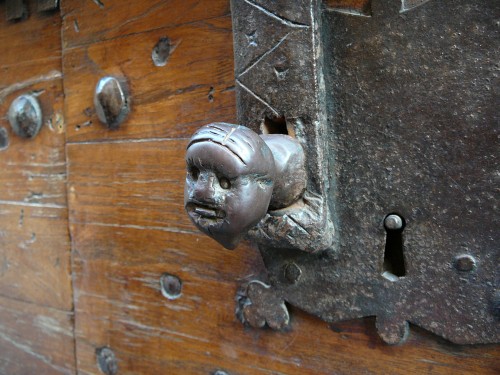
Here is a non-inclusive list of Italian superstitions so that you don’t put a foot wrong during your next visit:
The Evil Eye (Malocchio)
The Evil Eye is one of the most ancient superstitions in Italy. Every region seems to have their own version of the Evil Eye, but some take it more seriously than others. One thing they seem to have in common is that the Evil Eye is caused by jealousy and envy. One test for the Malocchio is done by dropping olive oil in a plate of water. If the oil forms one large drop in the middle of the plate it’s a sure sign of the Evil Eye, but after chanting the right prayers that usually only women are allowed to know, the oil may break up into tiny droplets and spread out, thus breaking the curse of the Evil Eye. The cornicello (see below) is also used to ward off the malocchio.
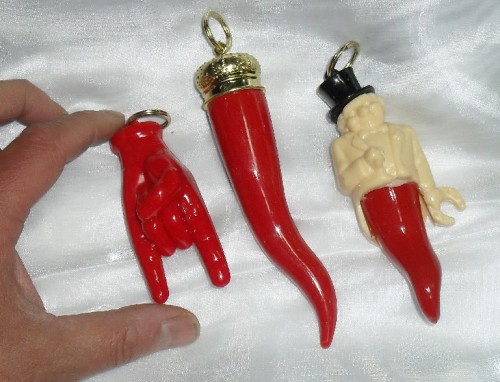
The Devil’s Horn (Corno)
The use of the Corno, or Devil’s Horn, is a curse of impotency or of the cuckold. The twisted phallic red coral, gold or silver amulet (cornicello) is often worn or carried by men to ward off curses on their “manliness” or mojo. Although many claim the amulet represents one of the horns of the devil, the Corno predates Christianity by thousands of years. The horned god Faunus was known for his wild nature and interest in fertility. The ancient Romans knew well Cernunnos, the horned Celtic god of fertility, life, animals, wealth, and the underworld. The horns of an African eland most resemble the original amulets.
Related to the Corno is the hand gesture (extending only the pinkie and index finger like a pair of horns) known as the mano cornuta, which can be used (pointing upwards or directly at the victim (cornuto)) to curse another or not so subtly send the message that a man’s wife or girlfriend is straying. This gesture can also be used to ward off the Evil Eye (pointing fingers down).
Lucky Numbers
The number 13 is lucky in Italy, especially when gambling. The number 13 is also associated with the Goddess of Fertility and the lunar cycles. It is thought the number brings prosperity and abundant life. Although 13 is considered lucky, sitting down to a table with 12 others is an ill omen. At the Last Supper Jesus ate with his 12 disciples before one of them, Judas Iscariot, betrayed him. Italians aim to avoid a similar turning of the tables. In modern times it seems the Friday 13 is starting to lose its charm in Italy, as with the rest of the world.
Unlucky Numbers
The number 17 is considered unlucky. This has to do with how it is written. Italians dislike the number so much that some hotels don’t have a 17th level. When 17 is written using Roman numerals XVII, it can be rearranged to spell the Roman word VIXI meaning “I have lived” and is found on ancient tombstones, thus tempting death. When written using Arabic numerals, 17 is still considered unlucky since it resembles a man ( the 1) hanging from a gallows (the 7).
Superstitions Pertaining to Bread
A loaf of bread must always be placed face up, or else bad luck will come. Again, some claim this has a basis in Christianity with the symbol of Christ as the Bread of Life. It is impolite to turn the bread up-side-down or to stick a knife into a loaf of bread. Bread is considered a staple of life and so every precaution is taken in order to prevent cursing the supply.
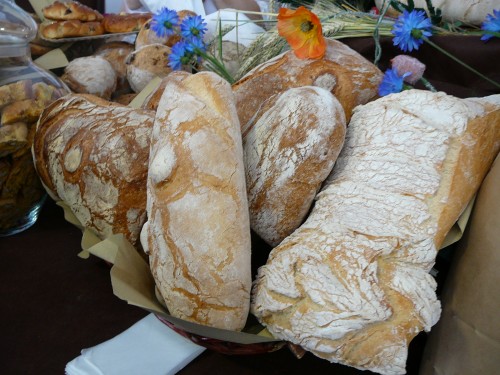
No Birds in the House
The presence of a bird in the house (either as a pet or accidentally) brings bad luck. Mere bird feathers, especially peacock feathers with their Evil Eye, can curse a household or the wearer of a feathery hat. Some say the superstition has a Christian origin from the Bible story where Peter denied that he knew Jesus three times before the cock crowed. Paintings of birds are also be avoided.
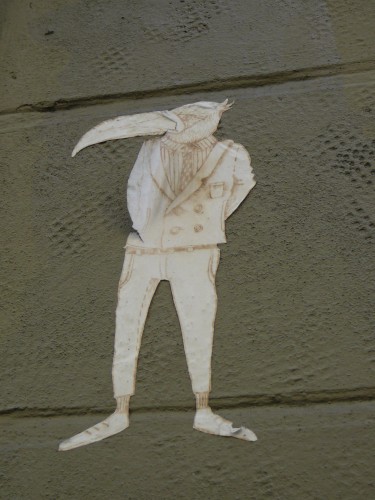
Blessing/Exorcising a New House
The blessing or exorcism of a new house in Italy is still practiced, especially when it comes to newlyweds. Moving into a first home was accompanied by the necessary rituals to rid the place of any spirits that may have ben left by the previous owners and could harm the new couple or their first child. A new broom is a common first gift to sweep away evil spirits. Sprinkled salt in the corners of the house will purify it. Neighborhood priests go house to house before Easter to bless each home with holy water (in modern times a tiny note is frequently wedged in the door to notify the residents of the service).
The Witchdoctor (Mago/Maga)
Southern Italians, Sardinians and Sicilians, mostly of the older generation, still mix folk medicine and ancient superstitions. When home remedies did not work and modern medicine was not an option (from either lack of money or language), some neighborhoods have the services of a man or woman trained in ancient practices, bordering on witchcraft.
Older Sicilians can recall ancient rites, involving making dolls to curse an enemy, amulets to protect themselves from evil, or, on the more positive side, love potions to encourage a slow suitor.
Marriage Superstitions
Singles, don’t let a broom touch your feet when someone is cleaning the floors. If you do, you will never be swept off your feet and get married. Likewise, never sweep over the feet of an unmarried person, or they will never marry.
Cats – Good and Bad
It’s bad luck to have a black cat cross your path. On the other hand, it’s considered a good fortune if you happen to hear a cat sneeze.
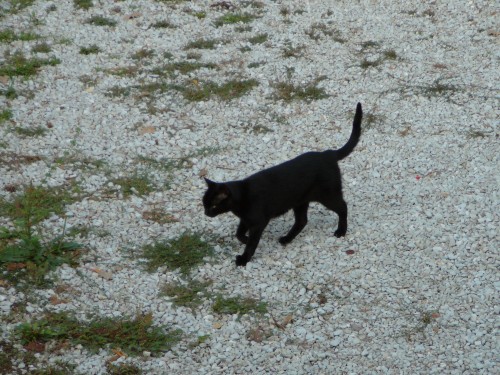
What Not to Put on a Bed
Don’t put a hat on a bed. Traditionally, when the sick were on their deathbeds a priest would come to receive their final confessions. The priest would remove his hat and set it on the bed so that he could put on the vestments. Thus, a hat’s temporary resting place is associated with eternal rest, a thought that keeps Italians from sleeping peacefully.
A bed should never face the door because it replicate the position of a coffin in a church.
Other unlucky items to keep off the bed are clothes hangers, hairbrushes, and shoes (of course the last is a hygiene issue, too).
Bad Luck Toasting
Never raise a toast with a glass full of water as it is bad luck. Don’t cross arms when you clink wine glasses together. Also, be sure look fellow toasters in the eye when clinking glasses and don’t slip up by forgetting to take a sip before setting your drink down, otherwise you will have seven years of bad sex.
Spills of All Kinds
Don’t spill salt or olive oil for fear of bad luck. This conception may have begun as a trick to motivate people to handle the previously expensive goods with care. If it happens, however, toss a bit of salt over each shoulder or rub a drop of oil behind each ear. If you spill wine at the dinner table, wet your fingers and dab some behind every person’s ear.
Hearses – Coming and Going
Don’t follow a hearse that isn’t carrying a coffin. You are in death’s wake and soon people might be attending your funeral. However, if the hearse bears a body, it isn’t in pursuit of another passenger, so you are safe, just like if you pass a hearse driving in the opposite direction.
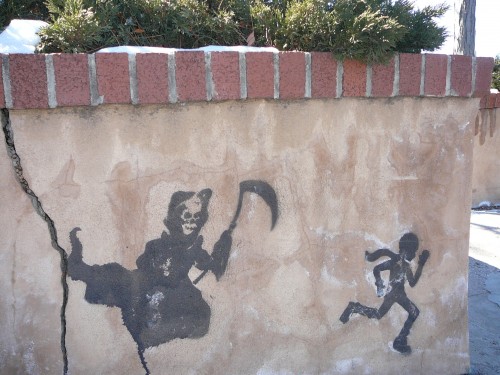
A Word to the Wise
Never trim toe and finger nails on Thursday.
Don’t start a journey, new project or get married on a Friday or a Tuesday.
Never have your hair cut during the new moon.
Never get a perm during your menstrual cycle.
Eat plenty of lentils on New Years’ Eve.
If you give a gift of a new wallet, always put at least a coin in it.
To prevent a downturn of fortune people practice tocca ferro and touch iron if they think something bad is going to occur. Italian men, knowing what must be protected at all costs, may tap their testicles, known as tocca palle. This is similar to knocking on wood.
Seeing a spider at night: a sure sign of monetary income.
When you drop something then someone is thinking of you and their name starts with the first letter of item dropped. (Drop a pen (penn a) and Pamela is thinking of you.)
When your nose itches, it’s either “pugni o baci,” punches or kisses.
Good Omens
Finding a button on the ground: a new friendship is on the horizon.
Dreaming of someone dying and you will have added ten years to their life.
When a new moon appears, the minute you see it say the New Moon Incantation: “Benvenuta Luna che mi porti fortuna!” – “Welcome, moon and may you bring me good fortune!” This is to be repeated, bowing respectfully at the lunar sliver 13 times with a coin in each hand.
Eat lentils on New Years Day and money will follow during the year.

Bad Omens
Killing a spider will take money away.
Breaking a mirror will result in seven years of bad luck.
Giving a handkerchief as a gift will bring tears.
Crossing silverware on the table foretells strife.
Passing each other the salt hand to hand (without putting it down on the table) will lead to imminent fight between the two.
Nuns crossing your path (or is this only for school children?).
Walking under a ladder.
Crossing arms when shaking hands in a group.
An owl sighting is a vision of the spirits of the dead.
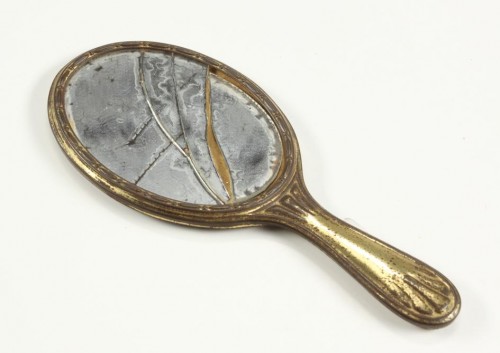
Sources and Websites of Interest about Italian Superstitions
About the etimology and general information about superstitions look here, here, here, here and here.
Rick Zulo at rickzulo.com
Eleanora Baldwin at aglioolioepeperoncino.com
Carol King at ItalyMagazine.com
More recent:
Gina Fava at Bostoniano.info
